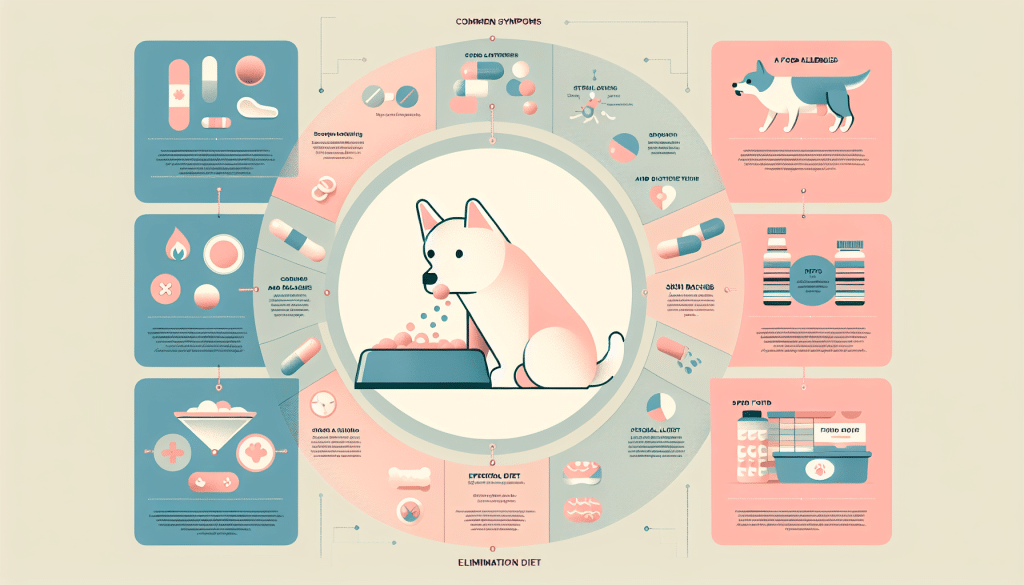If you’ve noticed your furry friend experiencing persistent itching, gastrointestinal issues, or skin irritations, it’s possible that they may be dealing with a dog food allergy. Just like humans, dogs can develop allergies to certain ingredients commonly found in their kibble. In this article, we’ll explore the signs and symptoms of dog food allergies, as well as effective strategies for managing and treating them. Whether you’re a seasoned dog owner or a first-time pet parent, understanding and addressing your pup’s dietary needs is crucial for their overall health and well-being. So, let’s dive into the world of dog food allergies and learn how to best care for our four-legged companions.

This image is property of images.pexels.com.
Symptoms of Dog Food Allergies
Digestive symptoms
If your furry friend is experiencing digestive symptoms, it could be a sign of a food allergy. Watch out for symptoms such as vomiting, diarrhea, excessive gas, or bloating. These symptoms can indicate that your dog’s body is having difficulty tolerating certain ingredients in their food.
Skin symptoms
Skin symptoms are another common indicator of food allergies in dogs. If you notice your dog constantly scratching, licking, or biting their skin, it could be a sign of an allergic reaction. Keep an eye out for redness, inflammation, rashes, or hot spots. These symptoms can be uncomfortable for your dog and may require immediate attention from your veterinarian.
Respiratory symptoms
In some cases, dog food allergies can also manifest as respiratory symptoms. If your dog is experiencing coughing, sneezing, wheezing, or difficulty breathing, it may be a result of an allergic reaction. These symptoms can be concerning and should be addressed promptly by a veterinarian.
Common Ingredients That Cause Allergies
Grains
Grains, such as wheat, corn, and soy, are common allergens for dogs. These ingredients are often used as fillers in commercial dog food and can trigger allergic reactions in sensitive individuals. If you suspect your dog has a grain allergy, consider switching to grain-free dog food options.
Dairy
Dairy products, including milk, cheese, and yogurt, can also cause allergies in dogs. Many dogs are lactose intolerant, which means they lack the necessary enzymes to digest lactose properly. If your dog exhibits symptoms like diarrhea or vomiting after consuming dairy products, it’s best to avoid feeding them these foods.
Meat
Believe it or not, even meat can be a source of allergies for dogs. Beef, chicken, and lamb are among the most common allergenic meats. If your dog has a meat allergy, you may need to explore alternative protein sources such as fish, venison, or duck to ensure they receive adequate nutrition without triggering an allergic reaction.

This image is property of images.pexels.com.
Diagnostic Methods for Dog Food Allergies
Elimination diets
Elimination diets are often used to identify specific food allergies in dogs. This involves feeding your dog a specialized diet consisting of a single protein and carbohydrate source that they have never been exposed to before. Gradually introducing new ingredients allows you to identify if any particular food triggers an allergic reaction.
Blood tests
Blood tests can also be conducted to diagnose dog food allergies. These tests measure the presence of specific antibodies in your dog’s blood, indicating an immune response to certain allergens. While blood tests can be helpful, they are not always completely accurate, and it’s best to consult with a veterinarian to ensure proper interpretation.
Skin tests
Similar to humans, dogs can undergo skin tests to identify potential food allergies. In this procedure, small amounts of allergens are applied to your dog’s skin, and any allergic reactions, such as redness or swelling, are monitored. Skin tests can provide valuable information about your dog’s allergens and help guide their dietary management.
Choosing the Right Dog Food for Allergies
Limited ingredient diets
Limited ingredient diets are specially formulated to minimize the number of potential allergens your dog is exposed to. These diets typically contain a single source of protein, such as fish or venison, and a limited number of carbohydrates. By avoiding common allergens, limited ingredient diets can help alleviate food allergies in dogs.
Grain-free diets
Grain-free diets are an excellent choice for dogs with grain allergies. These diets substitute grains with alternative carbohydrates like sweet potatoes, peas, or tapioca. Grain-free options are becoming increasingly popular, and many reputable brands offer a variety of grain-free dog food formulas to choose from.
Novel protein diets
In some cases, dogs may develop allergies to common protein sources like chicken or beef. Novel protein diets feature unique protein sources that your dog hasn’t been exposed to before, such as rabbit, kangaroo, or venison. These novel proteins can provide essential nutrients while minimizing the risk of triggering allergic reactions.

This image is property of images.pexels.com.
Introducing New Foods to Your Dog
Gradual transition
When introducing new foods to your dog, it’s important to do so gradually. Sudden dietary changes can upset your dog’s digestive system and potentially worsen their allergic reactions. Start by mixing small portions of the new food with their current food and slowly increase the new food’s proportion over several weeks.
Monitoring for reactions
During the transition period, closely monitor your dog for any signs of allergic reactions. Keep an eye on their digestive system, skin, and respiratory health to ensure they are tolerating the new food well. If you notice any adverse reactions, consult with your veterinarian to determine the best course of action.
Rotating proteins
Rotating proteins in your dog’s diet can help prevent the development of new food allergies. It’s recommended to periodically switch between different protein sources to expose your dog to a variety of nutrients and minimize the risk of allergic reactions. Consult with your veterinarian for guidance on implementing protein rotation into your dog’s diet.
Alternative Therapies for Dog Food Allergies
Probiotics
Probiotics can play a significant role in managing dog food allergies. These beneficial bacteria promote a healthy gut microbiome, which can strengthen the immune system and reduce the risk of allergic reactions. Talk to your veterinarian about incorporating probiotic supplements into your dog’s diet.
Omega-3 fatty acids
Omega-3 fatty acids have anti-inflammatory properties that can help alleviate skin symptoms associated with dog food allergies. These essential fatty acids can be found in fish oil supplements, which can be added to your dog’s diet. Always consult with your veterinarian to determine the appropriate dosage for your dog.
Aloe vera
Aloe vera is known for its soothing properties and can provide relief to dogs experiencing skin irritation or inflammation from food allergies. It can be applied topically in gel form or added to your dog’s food or water. However, it’s crucial to ensure that the aloe vera product you use is safe for dogs and free of any harmful additives.

Managing Severe Allergic Reactions
Administering emergency medication
In cases of severe allergic reactions, it’s important to have emergency medication on hand. Your veterinarian can prescribe antihistamines or epinephrine pens that can help alleviate symptoms and buy valuable time before professional veterinary care is available. Familiarize yourself with proper administration techniques and keep these medications easily accessible.
Seeking veterinary help
If your dog experiences a severe allergic reaction, it’s crucial to seek immediate veterinary assistance. Your veterinarian can provide appropriate medical treatment and monitor your dog’s condition. Identifying the cause of the allergic reaction is essential to prevent future occurrences and ensure your dog’s health and well-being.
Preventing future reactions
Once your dog has experienced a severe allergic reaction, it’s important to take steps to prevent future occurrences. Work closely with your veterinarian to identify the specific allergens and adjust your dog’s diet accordingly. It may be necessary to strictly avoid certain ingredients or choose hypoallergenic dog food options to minimize the risk of future reactions.
Preventing Cross-Contamination
Separate food preparation
To avoid cross-contamination, it’s crucial to prepare your dog’s food separately from human food. Use separate cutting boards, utensils, and food storage containers specifically designated for your dog. This helps prevent allergens from being accidentally transferred from one food to another.
Avoiding shared utensils
Similarly, it’s essential to avoid using the same utensils to handle both human and dog food. Even trace amounts of allergens can trigger an allergic reaction in sensitive dogs. Keep separate utensils for each type of food to prevent accidental contamination.
Cleaning food bowls
Regularly clean your dog’s food bowls to prevent the buildup of allergens. Wash the bowls with hot, soapy water after each meal to remove any remnants of food that could potentially trigger an allergic reaction. This simple step can significantly reduce the risk of cross-contamination.
Importance of Consulting with a Veterinarian
Proper diagnosis
While it’s possible to make educated guesses about your dog’s allergies, only a veterinarian can provide an accurate diagnosis. Consulting with a veterinarian allows for proper testing and identification of the specific allergens affecting your dog. This is crucial to create a targeted treatment plan.
Treatment guidance
A veterinarian can provide invaluable guidance when it comes to treating dog food allergies. They can recommend appropriate dietary changes, medications, and alternative therapies to manage your dog’s condition effectively. Their expertise ensures that your dog receives the best possible care.
Nutritional advice
Choosing the right dog food for allergies can be a daunting task. A veterinarian can provide tailored nutritional advice to meet your dog’s specific dietary needs. They can help you navigate through various dog food options, ensuring your dog’s allergies are managed while maintaining a balanced diet.
Conclusion
Identifying and managing dog food allergies is essential for the health and well-being of your furry friend. By recognizing the symptoms, understanding common allergens, utilizing diagnostic methods, and making informed choices about their diet, you can provide your dog with the care they need. Remember to consult with a veterinarian throughout the process for proper diagnosis, treatment guidance, and nutritional advice. With the right approach, you can minimize allergic reactions, improve your dog’s quality of life, and ensure they thrive.


8 comments
[…] Aggression in dogs can stem from various factors, including genetics, socialization experiences, training methods, previous trauma or abuse, and overall environment. It is important to consider all these aspects when assessing a dog’s level of aggression rather than blaming it solely on breed. By understanding these contributing factors, appropriate training, socialization, and behavior modification techniques can be implemented to help reduce and manage aggressive behaviors in any dog. […]
[…] such as near the entryway or in a mudroom. Use these storage spaces to store essentials like dog food, treats, grooming supplies, and extra leashes. Label each shelf or cubby to ensure that everything […]
[…] in their overall well-being. In this article, we’ll explore the various ways diet affects dogs and why making informed food choices is essential for keeping your four-legged companion happy and healthy. Whether you’re […]
[…] Dogs can be allergic to a wide range of substances. Common allergens for dogs include pollen from grasses, trees, and weeds, mold spores, dust mites, certain foods, such as beef, chicken, wheat, or soy, insect bites or stings, certain fabrics or household chemicals, and even certain medications. Identifying the specific allergens that trigger a dog’s allergies is crucial for effective management. […]
[…] life if not properly addressed. In this comprehensive guide, we’ll explore the importance of managing chronic conditions in dogs and provide valuable insights for owners on how to ensure their furry friends live their best […]
[…] significant advantage of grain-free dog food is its potential to reduce allergies in our four-legged companions. By eliminating common grain-related allergens from your dog’s […]
[…] their responses and tailor your training methods to suit their individual personalities. Some dogs may be more motivated by food rewards, while others may respond better to praise or playtime. Understanding your dog’s […]
[…] more serious. Regular veterinary check-ups allow trained professionals to thoroughly examine your dog and identify any signs or symptoms that might indicate an underlying health problem. By catching these issues […]
Comments are closed.